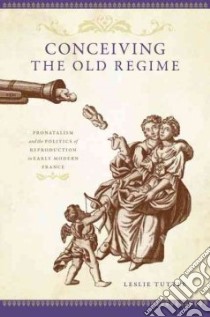Conceiving the Old Regime - 9780195381603
Un libro in lingua di Leslie Tuttle edito da Oxford University Press, 2010
- € 48.80
- Il prezzo è variabile in funzione del cambio della valuta d’origine
"In Conceiving the Old Regime, Leslie Tuttle clearly demonstrates how issues of population growth, fertility, child mortality, and pronatalism permeated French culture intermittently for over a century since 1666. Meticulously researched and fluidly written, this book is engaging and a pleasure to read. Tuttle goes beyond the work of other historians in contributing innovative and important arguments about state building and in elucidating complex connections between gender and the state. Conceiving the Old Regime makes a significant contribution to family history and statebuilding in early modern France by opening a new window that allows us to see the interplay between individuals, communities, and the state." Rachel G. Fuchs, Arizona State University
"Leslie Tuttle's innovative study of early modern France offers new insights into the ways the state of France and French families negotiated mutual public benefits. It is impeccably researched, well organized, conceptually astute, tightly argued, and beautifully written. A tour de force, it untangles a historical puzzle through arguments based on the law stories of men and women living in society, along with the bureaucratic entanglements of state officials wed to a pronatalist policy." Sarah Hanley, University of Iowa
"In Conceiving the Old Regime, Leslie Tuttle uses the 1666 Edict on Marriage to illuminate a century of legislation on marriage by the state (in competition with the church), a long debate over reproduction and population size, and Louis XIV's efforts to persuade his subjects to align their interests with his. The book will have a major impact on understandings of the relationship between family and political development: on current questions about statebuilding in the age of absolutism, the paradoxical disintegration of the French monarchy as it intensified its charitable interventions in its subjects' lives during the final two decades preceding the Revolution, and the connection between private lives and public order in French history." Carolyn Lougee Chappell, Stanford University
"Conceiving the Old Regime skillfully unpacks a striking piece of the French state's efforts to manage family life and equally important the ways in which fathers were able to use the legislation to leverage their own interests. A pioneering exploration of a little-known aspect of the much-studied Louis XIV partnership." Julie Hardwick, author of Family Business: Litigation and the Political Economies of Daily Life in Early Modern France
Early Modern Rulers believed that the more subjects over whom they ruled, the more powerful they would be. In 1666, France's Louis XIV and his minister Jean-Baptiste Colbert put this axiom into effect, instituting policies designed to encourage marriage and very large families. Their Edict on Marriage promised lucrative rewards to French men of all social statuses who married before age twenty-one or fathered ten or more living, legitimate children. So began a 150-year experiment in governing the reproductive process, the largest populationist initiative since the Roman Empire.
Conceiving the Old Regime traces the consequences of premodern pronatalism for the women, men, and government officials tasked with procreating the abundant supply of soldiers, workers, and taxpayers deemed essential for France's glory. While everyone knew---in a practical rather than a scientific sense---how babies were made, the notion that humans should exercise control over reproduction remained deeply controversial in a Catholic nation.
Drawing on a wealth of archival sources, Leslie Tuttle shows how royal bureaucrats mobilized the limited power of the premodern state in an attempt to shape procreation in the king's interest. By the late eighteenth century, marriage, reproduction, and family size came to be hot-button political issues, inspiring debates that contributed to the character of the modern French nation.
Conceiving the Old Regime reveals the deep historical roots of France's perennial concern with population, and connects the intimate lives of men and women to the public world of power and the state.
Informazioni bibliografiche
- Titolo del Libro in lingua: Conceiving the Old Regime
- Sottotitolo: Pronatalism and the Politics of Reproduction in Early Modern France
- Lingua: English
- Autore: Leslie Tuttle
- Editore: Oxford University Press
- Collana: (Hardcover)
- Data di Pubblicazione: 25 Gennaio '10
- Genere: HISTORY
- Argomenti : Family policy France History Fertility, Human France History
- Pagine: 247
- ISBN-10: 0195381602
- EAN-13: 9780195381603


